Datasheet
Year, pagecount:2007, 2 page(s)
Language:English
Downloads:5
Uploaded:May 31, 2021
Size:595 KB
Institution:
-
Comments:
Attachment:-
Download in PDF:Please log in!
Comments
No comments yet. You can be the first!
Most popular documents in this category
Content extract
APHIS Factsheet Veterinary Services March 2007 Biosecurity: Protecting Your Livestock and Poultry An important first step is to identify some of the greatest risks for introducing disease to your farm. Biosecurity means doing everything you can to reduce the chances of an infectious disease being carried onto your farm by people, animals, equipment, or vehicles. It also means doing everything you can to reduce the chance of disease leaving your farm. Healthy herds and flocks contribute to the health of U.S animal agriculture as a whole An outbreak of a foreign animal disease in the United States could seriously damage the domestic livestock and poultry industries. These animal diseases can have significant economic consequences from restrictions placed on the United States by its trading partners. Losses from foreign animal disease outbreaks can also hit close to home with animal deaths, reduced productivity, as well as treatment, labor, and management costs and the loss of
valuable genetic material from certain animals. The 2002–03 outbreak of exotic Newcastle disease in the United States resulted in the destruction of more than 4 million birds and cost taxpayers some $170 million to eradicate. For producers and industry, the final result of a foreign animal disease outbreak is often reduced revenue and increased costs. Keeping exotic or foreign animal diseases out of the United States is the responsibility of the U.S Department of Agriculture’s (USDA) Animal and Plant Health Inspection Service’s (APHIS) Veterinary Services (VS) program. Within VS, the Emergency Management and Diagnostics staff provides expertise on exotic animal diseases, ensures adequate disease surveillance within the United States, maintains a high level of emergency preparedness, and provides the needed resources to respond to and eliminate disease outbreaks in this country and its territories. In order to effectively protect against such outbreaks, VS needs the help of
veterinarians, livestock producers, and State and local governments. While it may not be possible for individuals to prevent a disease from arriving on our Nation’s shores, biosecurity practices can reduce the risk of introducing a disease onto your farm or spreading it to neighboring farms. Greatest Risks 1. Today’s global marketplace gives more access than ever before to agricultural commodities from around the world. It also requires greater vigilance to ensure that imports and exports comply with international standards for trade. APHIS works to maintain clear rules for trade involving animals and animal products arriving in and leaving the United States. Unfortunately, illegal agricultural imports and smuggled prohibited products pose an ever greater threat on a daily basis. Through its various programs and laboratories, APHIS’ diligence helps protect our country from foreign animal diseases. 2. On the farm, one of the greatest risks comes from bringing new animals onto
your premises or commingling or exposing your animals to other animals. It is a common way to introduce new disease-causing organisms. As a rule of thumb, new animals and those who have been commingled or exposed to other animals should be segregated for 30 days. 3. Farm visitors can pose a risk, particularly if they have been on other farms with animals or have recently been in other countries with diseases exotic to the United States. 4. Farm equipment that has been in contact with livestock or manure can be a source of infection. Equipment should not be shared with other farms unless it has been thoroughly cleaned and disinfected before it reaches your property. Common Sense Biosecurity Measures You Can Follow The following do’s and don’ts provide some basic tips for you to help prevent foreign animal disease outbreaks. 1. Keep Your Distance Restrict access to your property and your livestock or poultry, and post a sign. Have one area where visitors can enter Do not allow
visitors near livestock or poultry unless absolutely necessary, and then make sure visitors have clean footwear (disposable boots work well) and clothes (supply these for them). Have an area where visitors can change clothes and provide shower-in, shower-out facilities if possible. Discourage handling of animals by all visitors. Require and teach biosecurity to family, employees, and all visitors coming into, or involved with, your livestock or poultry production area. 2. Keep It Clean You, your staff, and your family should follow biosecurity procedures for cleanliness. Wear clean clothes, scrub your shoes/boots with disinfectant, and wash hands thoroughly. Keep equipment and vehicles clean and insist that all machinery and vehicles must be cleaned before entering your property. Maintain programs to control birds and rodents that can carry and spread diseases. 3. Don’t Haul Disease Home If you, your family, or employees have been on other farms, at feed lots, petting zoos,
auctions, or other places where there is livestock and poultry, clean and disinfect your truck or car tires and equipment before going home. If you have shown livestock or birds at a fair or exhibition, or are bringing in new animals, keep them separated from the rest of your herd or flock for 30 days after the event. Always change clothes and wash your hands before returning to your animals. 4. Don’t Borrow Disease From Your Neighbor Do not share equipment, tools, or other supplies with your neighbors or other livestock or poultry owners. If you do share these items be sure to clean and disinfect them before they reach your property. 5. Look for Signs of Infectious Diseases You should know what diseases are of concern for your herd or flock and be on the lookout for unusual signs or behavior, severe illness and/or sudden deaths. When possible, assess the health of your animals daily. Early detection is important to prevent the spread of disease 6. Report Sick Animals Don’t wait.
Report serious or unusual animal health problems to your veterinarian, local extension office, or State or Federal animal health officials. USDA operates a toll-free hotline (1–866–536–7593) with veterinarians to help you. There is no charge for this service. United States Department of Agriculture • Safeguarding American Agriculture Some dangerous foreign animal diseases you need to guard against include high pathogenicity avian influenza, foot-and-mouth disease, classical swine fever (hog cholera), swine vesicular disease, African swine fever, vesicular stomatitis, rinderpest, exotic Newcastle disease, and sheep pox. You should contact your State department of agriculture to learn about plans in place in your State for handling foreign animal diseases. APHIS Additional Information For more information on how to protect your livestock and poultry from dangerous foreign animal diseases, contact: U.S Department of Agriculture APHIS, VS, Emergency Management and Diagnostics
Program 4700 River Road, Unit 41 Riverdale, MD 20737–1231 Phone: (301) 734–5416 Fax: (301) 734–7817 or visit our Web site at http://www.aphisusdagov/vs The U.S Department of Agriculture (USDA) prohibits discrimination in all its programs and activities on the basis of race, color, national origin, age, disability, and where applicable, sex, marital status, familial status, parental status, religion, sexual orientation, genetic information, political beliefs, reprisal, or because all or part of an individual’s income is derived from any public assistance program. (Not all prohibited bases apply to all programs.) Persons with disabilities who require alternative means for communication of program information (Braille, large print, audiotape, etc.) should contact USDA’s TARGET Center at (202) 720–2600 (voice and TDD). To file a complaint of discrimination, write to USDA, Director, Office of Civil Rights, 1400 Independence Avenue, S.W , Washington , DC 20250–9410 , or call
(800) 795–3272 (voice) or (202) 720–6382 (TDD). USDA is an equal opportunity provider and employer. Animal and Plant Health Inspection Service • Safeguarding American Agriculture
valuable genetic material from certain animals. The 2002–03 outbreak of exotic Newcastle disease in the United States resulted in the destruction of more than 4 million birds and cost taxpayers some $170 million to eradicate. For producers and industry, the final result of a foreign animal disease outbreak is often reduced revenue and increased costs. Keeping exotic or foreign animal diseases out of the United States is the responsibility of the U.S Department of Agriculture’s (USDA) Animal and Plant Health Inspection Service’s (APHIS) Veterinary Services (VS) program. Within VS, the Emergency Management and Diagnostics staff provides expertise on exotic animal diseases, ensures adequate disease surveillance within the United States, maintains a high level of emergency preparedness, and provides the needed resources to respond to and eliminate disease outbreaks in this country and its territories. In order to effectively protect against such outbreaks, VS needs the help of
veterinarians, livestock producers, and State and local governments. While it may not be possible for individuals to prevent a disease from arriving on our Nation’s shores, biosecurity practices can reduce the risk of introducing a disease onto your farm or spreading it to neighboring farms. Greatest Risks 1. Today’s global marketplace gives more access than ever before to agricultural commodities from around the world. It also requires greater vigilance to ensure that imports and exports comply with international standards for trade. APHIS works to maintain clear rules for trade involving animals and animal products arriving in and leaving the United States. Unfortunately, illegal agricultural imports and smuggled prohibited products pose an ever greater threat on a daily basis. Through its various programs and laboratories, APHIS’ diligence helps protect our country from foreign animal diseases. 2. On the farm, one of the greatest risks comes from bringing new animals onto
your premises or commingling or exposing your animals to other animals. It is a common way to introduce new disease-causing organisms. As a rule of thumb, new animals and those who have been commingled or exposed to other animals should be segregated for 30 days. 3. Farm visitors can pose a risk, particularly if they have been on other farms with animals or have recently been in other countries with diseases exotic to the United States. 4. Farm equipment that has been in contact with livestock or manure can be a source of infection. Equipment should not be shared with other farms unless it has been thoroughly cleaned and disinfected before it reaches your property. Common Sense Biosecurity Measures You Can Follow The following do’s and don’ts provide some basic tips for you to help prevent foreign animal disease outbreaks. 1. Keep Your Distance Restrict access to your property and your livestock or poultry, and post a sign. Have one area where visitors can enter Do not allow
visitors near livestock or poultry unless absolutely necessary, and then make sure visitors have clean footwear (disposable boots work well) and clothes (supply these for them). Have an area where visitors can change clothes and provide shower-in, shower-out facilities if possible. Discourage handling of animals by all visitors. Require and teach biosecurity to family, employees, and all visitors coming into, or involved with, your livestock or poultry production area. 2. Keep It Clean You, your staff, and your family should follow biosecurity procedures for cleanliness. Wear clean clothes, scrub your shoes/boots with disinfectant, and wash hands thoroughly. Keep equipment and vehicles clean and insist that all machinery and vehicles must be cleaned before entering your property. Maintain programs to control birds and rodents that can carry and spread diseases. 3. Don’t Haul Disease Home If you, your family, or employees have been on other farms, at feed lots, petting zoos,
auctions, or other places where there is livestock and poultry, clean and disinfect your truck or car tires and equipment before going home. If you have shown livestock or birds at a fair or exhibition, or are bringing in new animals, keep them separated from the rest of your herd or flock for 30 days after the event. Always change clothes and wash your hands before returning to your animals. 4. Don’t Borrow Disease From Your Neighbor Do not share equipment, tools, or other supplies with your neighbors or other livestock or poultry owners. If you do share these items be sure to clean and disinfect them before they reach your property. 5. Look for Signs of Infectious Diseases You should know what diseases are of concern for your herd or flock and be on the lookout for unusual signs or behavior, severe illness and/or sudden deaths. When possible, assess the health of your animals daily. Early detection is important to prevent the spread of disease 6. Report Sick Animals Don’t wait.
Report serious or unusual animal health problems to your veterinarian, local extension office, or State or Federal animal health officials. USDA operates a toll-free hotline (1–866–536–7593) with veterinarians to help you. There is no charge for this service. United States Department of Agriculture • Safeguarding American Agriculture Some dangerous foreign animal diseases you need to guard against include high pathogenicity avian influenza, foot-and-mouth disease, classical swine fever (hog cholera), swine vesicular disease, African swine fever, vesicular stomatitis, rinderpest, exotic Newcastle disease, and sheep pox. You should contact your State department of agriculture to learn about plans in place in your State for handling foreign animal diseases. APHIS Additional Information For more information on how to protect your livestock and poultry from dangerous foreign animal diseases, contact: U.S Department of Agriculture APHIS, VS, Emergency Management and Diagnostics
Program 4700 River Road, Unit 41 Riverdale, MD 20737–1231 Phone: (301) 734–5416 Fax: (301) 734–7817 or visit our Web site at http://www.aphisusdagov/vs The U.S Department of Agriculture (USDA) prohibits discrimination in all its programs and activities on the basis of race, color, national origin, age, disability, and where applicable, sex, marital status, familial status, parental status, religion, sexual orientation, genetic information, political beliefs, reprisal, or because all or part of an individual’s income is derived from any public assistance program. (Not all prohibited bases apply to all programs.) Persons with disabilities who require alternative means for communication of program information (Braille, large print, audiotape, etc.) should contact USDA’s TARGET Center at (202) 720–2600 (voice and TDD). To file a complaint of discrimination, write to USDA, Director, Office of Civil Rights, 1400 Independence Avenue, S.W , Washington , DC 20250–9410 , or call
(800) 795–3272 (voice) or (202) 720–6382 (TDD). USDA is an equal opportunity provider and employer. Animal and Plant Health Inspection Service • Safeguarding American Agriculture
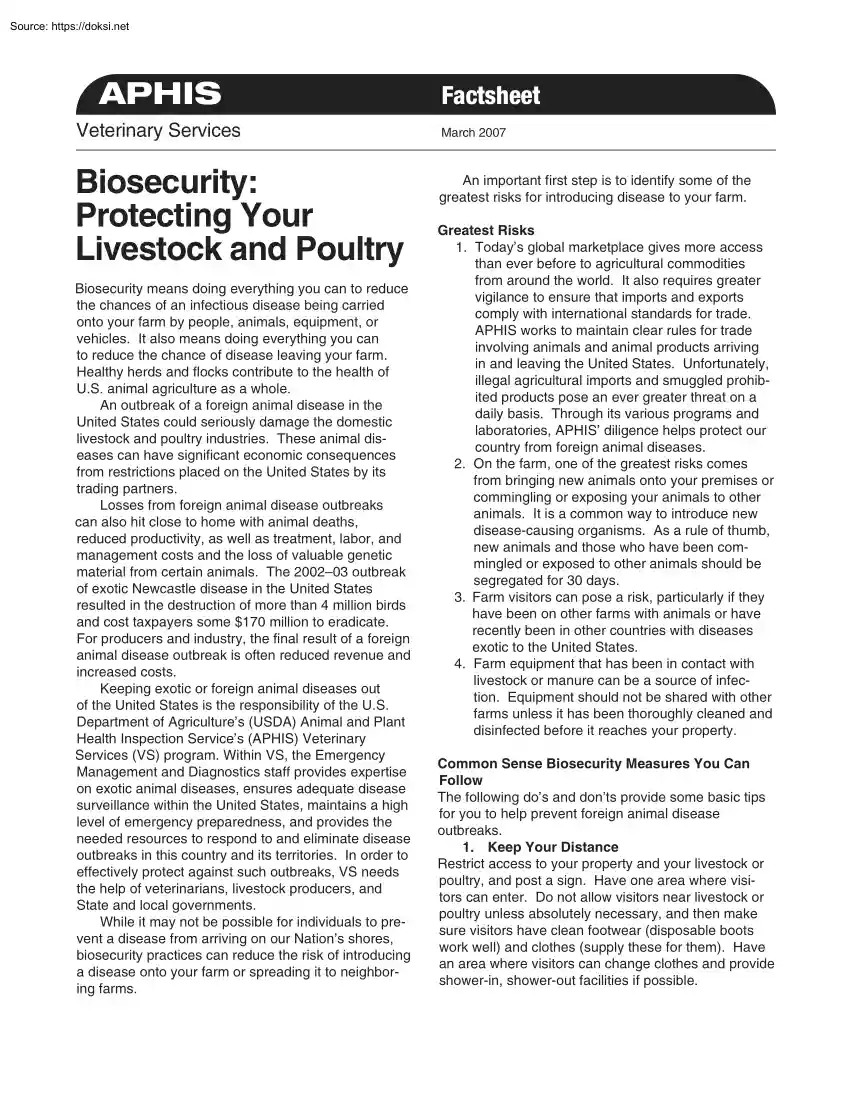
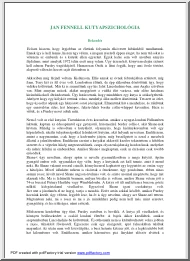
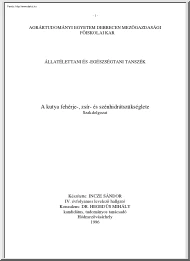
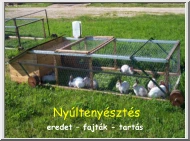
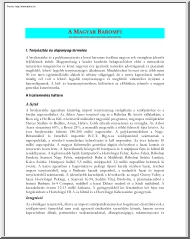
 When reading, most of us just let a story wash over us, getting lost in the world of the book rather than paying attention to the individual elements of the plot or writing. However, in English class, our teachers ask us to look at the mechanics of the writing.
When reading, most of us just let a story wash over us, getting lost in the world of the book rather than paying attention to the individual elements of the plot or writing. However, in English class, our teachers ask us to look at the mechanics of the writing.